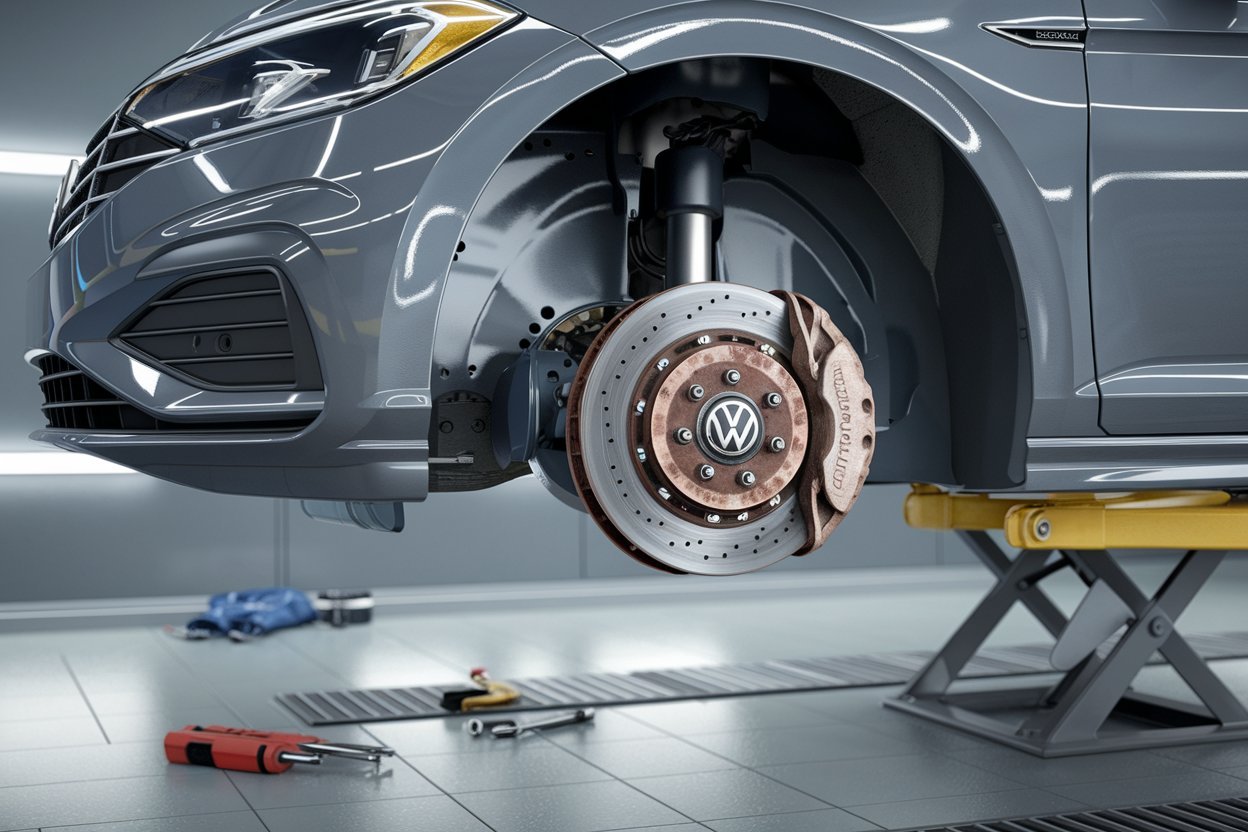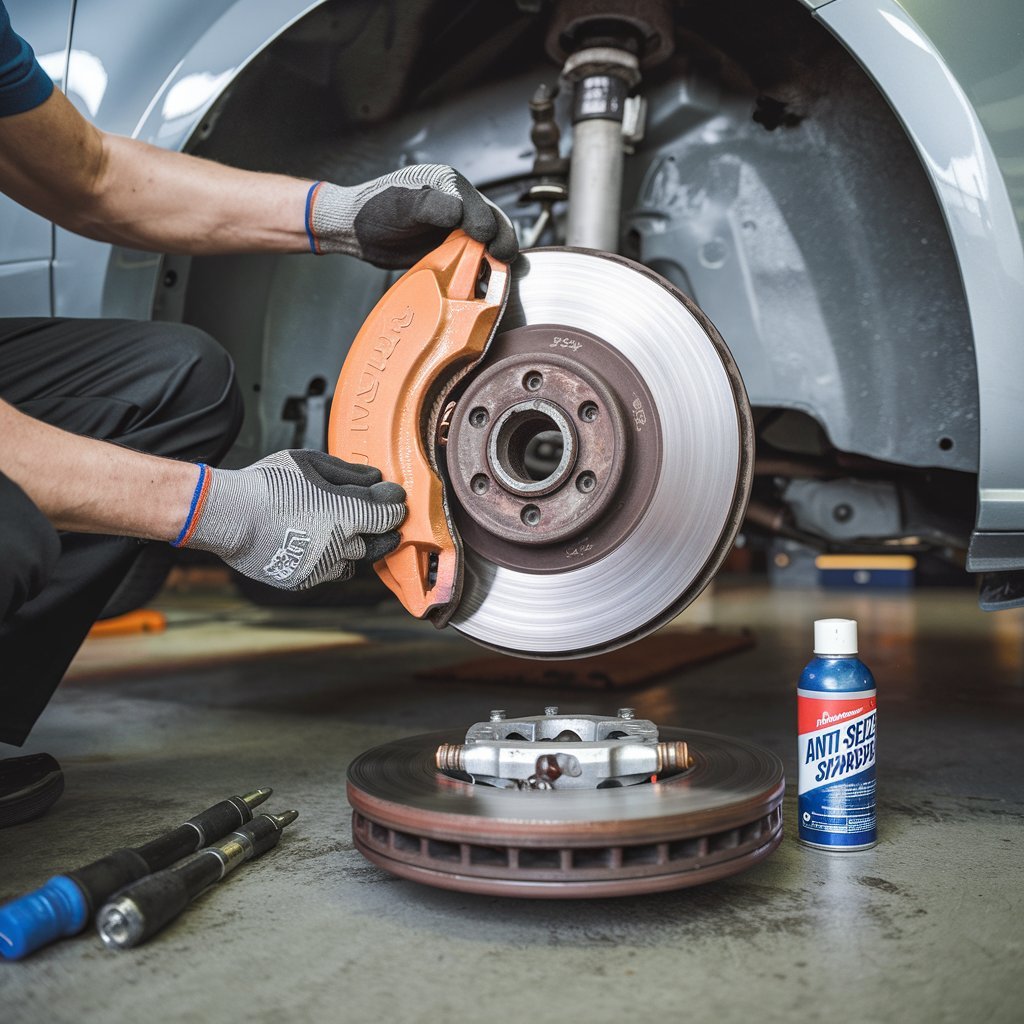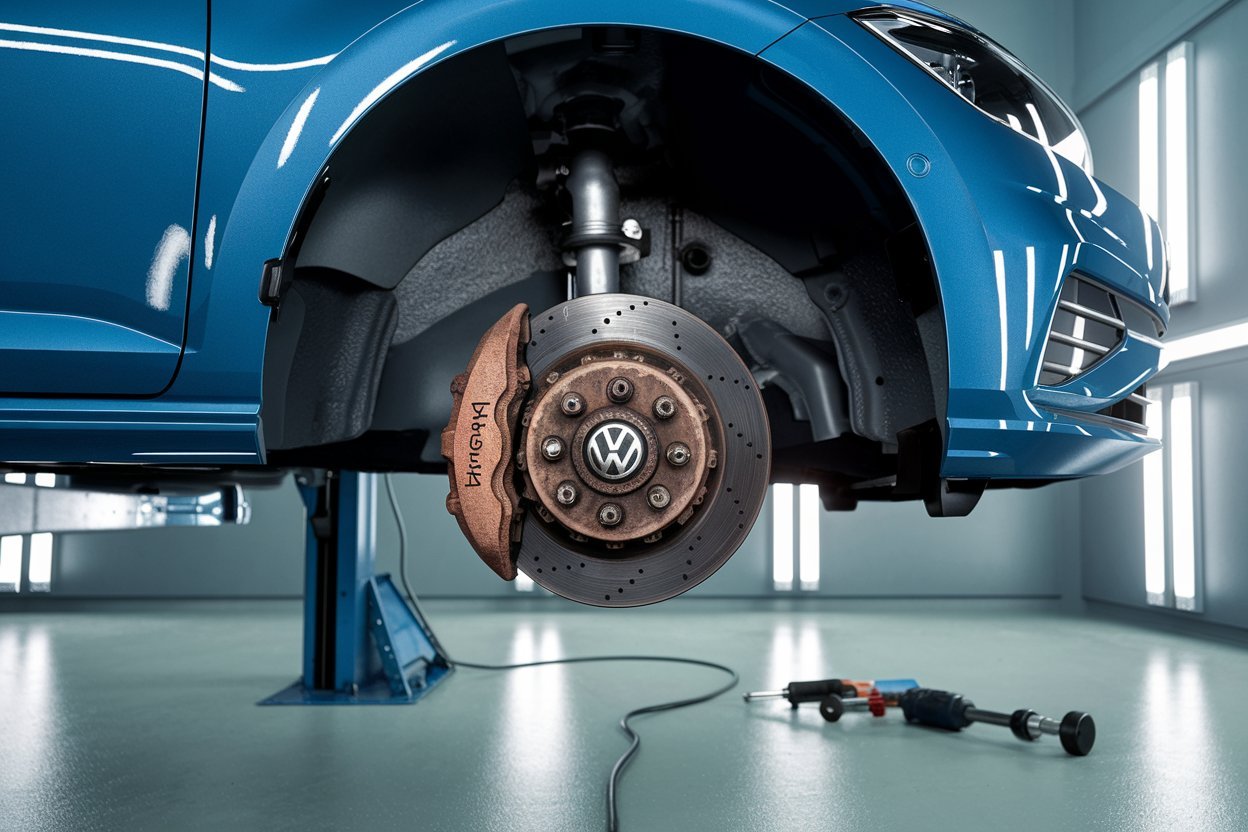Does your VW Jetta brake pedal feel shaky, or do you hear grinding noises when stopping? These are clear signs of worn-out brake rotors, which can increase your braking distance by up to 50%, putting safety at risk. In Dubai’s heat, VW Jetta brake rotors wear out faster due to extreme temperatures and heavy braking. On average, brake rotors need replacement every 50,000 – 70,000 km, but aggressive driving or stop-and-go traffic can shorten their lifespan. We use genuine Volkswagen brake rotors and precision installation to restore your braking power. Book your VW Jetta brake rotor replacement in Dubai today and get 15% off—because every second counts when you hit the brakes!

Brake rotors, also called brake discs, are crucial components of the Volkswagen Jetta braking system. When you press the brake pedal, the brake calipers squeeze the brake pads against the rotors, creating friction that slows down or stops the vehicle. This friction converts the kinetic energy of the moving car into heat energy, which dissipates through the rotor’s surface.
Volkswagen Jetta brake rotors are designed to withstand high temperatures and heavy braking, but over time, they wear down, develop grooves, or warp due to excessive heat buildup. This reduces braking efficiency, leading to longer stopping distances, vibrations, and potential safety risks.
The Volkswagen Jetta braking system relies on both front and rear brake rotors, but they serve different functions and experience varying levels of wear. Understanding these differences helps in maintaining optimal braking performance and ensuring timely VW Jetta brake rotor replacement.
Since front rotors handle most of the braking force, they wear out 1.5 to 2 times faster than rear rotors. However, if rear rotors are neglected or exposed to excessive corrosion, they may also require early replacement. Regular brake inspections ensure both front and rear VW Jetta rotors remain in optimal condition.
Brake rotors play a critical role in your Volkswagen Jetta’s braking system, ensuring smooth and safe stops. Over time, they wear out due to heat, friction, and driving conditions. If you notice any of these specific warning signs, it’s time for a VW Jetta brake rotor replacement.
A shaking or pulsating brake pedal is a sign of warped brake rotors, often caused by excessive heat buildup. This leads to inconsistent braking and reduced control.
High-pitched brake squealing suggests uneven rotor wear, while grinding indicates brake pads have worn down completely, causing metal-on-metal contact with the rotors.
If your VW Jetta takes longer to stop, worn-out brake rotors reduce friction, making braking less effective and increasing the risk of accidents.
Deep grooves, cracks, or scoring on the rotor surface reduce brake pad contact, leading to uneven braking and potential brake failure.
A burning odor after braking, especially during heavy use, indicates overheated brake rotors, which can cause brake fade and reduced stopping power.
Uneven brake rotor wear or stuck calipers can cause your Volkswagen Jetta to pull left or right when braking, leading to unsafe handling.
Ignoring these symptoms can cause severe braking issues and expensive repairs. If you’re experiencing any of these warning signs, book a VW Jetta brake rotor replacement in Dubai for optimal performance and safety.

The lifespan of VW Jetta brake rotors varies based on driving conditions, braking habits, and maintenance. On average, Volkswagen Jetta brake rotors last between 50,000 to 70,000 km, but in Dubai’s hot climate and stop-and-go traffic, they may wear out sooner. Regular brake system inspections help prevent premature rotor failure.
If you notice brake pedal vibrations, grinding noises, longer stopping distances, or visible scoring on the rotors, it’s time for a VW Jetta brake rotor replacement in Dubai. Ignoring these signs can lead to unsafe braking performance and higher repair costs.
Choosing the right VW Jetta brake rotors is important for safe braking, heat control, and durability. If your rotors are worn out or damaged, upgrading to the right type during a VW Jetta brake rotor replacement can improve braking performance. Below are four main types of Volkswagen Jetta brake rotors, each designed for different driving needs.
These are factory-installed rotors made by Volkswagen and designed for daily driving. They offer smooth braking, low noise, and reliable performance under normal conditions. While they work well for city and highway driving, they may wear out faster under extreme heat or aggressive braking.
These rotors have holes drilled through them to improve cooling and heat dissipation, making them ideal for Dubai’s hot climate. They also help in wet conditions by allowing water to escape, reducing the risk of brake fade. However, drilled rotors are not ideal for heavy braking, as the holes may weaken over time.
These feature machined grooves that remove brake dust and gas buildup, ensuring stronger braking power. Slotted rotors are more durable than drilled rotors and work well for high-speed driving, heavy loads, or frequent braking. However, they may cause faster brake pad wear due to increased friction.
These rotors combine both drilled holes and slots, providing maximum cooling and debris removal. They are best for high-performance vehicles or aggressive drivers who need strong, consistent braking. While they offer better heat control and braking efficiency, they are more expensive than other options.
A VW Jetta brake rotor replacement is essential for maintaining braking efficiency, safety, and stopping power. We follow a step-by-step process to ensure your Volkswagen Jetta brake rotors are replaced accurately and professionally.
Keeping your Volkswagen Jetta’s braking system in top condition is essential for safety and performance. The cost of VW Jetta brake rotor replacement in Dubai depends on rotor type, labor charges, and part quality. Below are estimated brake rotor replacement costs to help you plan your service.
These are estimated prices and may vary based on VW Jetta model year and rotor condition. For an exact quote, contact us, and our team will provide a detailed cost breakdown based on your vehicle’s needs. Regular VW Jetta brake rotor replacement ensures better stopping power, longer brake pad life, and safer driving on Dubai roads.
If your VW Jetta’s brakes feel shaky, make noise, or take longer to stop, it’s time for a VW Jetta brake rotor replacement. At [Your Company Name], our Volkswagen-trained technicians replace worn rotors using genuine VW parts or high-quality alternatives to ensure safe and smooth braking. We offer quick service, competitive prices, and a 15% discount for a limited time. Book your appointment today and drive with confidence on Dubai’s roads.

Trust our team of Expert Volkswagen Mechanics at our Volkswagen Service Center in Dubai for all your Volkswagen Repair and service needs.
Our Top-Notch Volkswagen Service Center in Dubai have the advanced diagnostic tools and Volkswagen experts to accurately identify and resolve any issues with your Volkswagen.
With over 1200+ Volkswagen repaired, our Volkswagen Service Center in Dubai is the trusted Garage for comprehensive and expert Volkswagen Repair services.
Most of the vehicles get damaged just because of maintenance neglect you take
Brake rotors and pads work together, but they wear at different rates. If your VW Jetta brake rotors are deeply grooved, cracked, or below the minimum thickness, they need replacement. However, if your brake pads are worn out but the rotors are still smooth and within spec, only the pads need changing. A professional inspection can determine whether you need a full brake service or just pads.
It is not recommended to replace only one rotor. VW Jetta brake rotors should always be replaced in pairs (both front or both rear) to maintain even braking force and balance. Replacing a single rotor can cause uneven wear, vibrations, and braking instability, affecting safety.
Driving with worn-out brake rotors can lead to longer stopping distances, increased brake pedal effort, and damage to other braking components. Over time, severely warped or grooved rotors can cause caliper misalignment, brake pad failure, and even ABS sensor malfunctions. Timely VW Jetta brake rotor replacement prevents expensive repairs and safety risks.
The best brake rotors for a VW Jetta depend on your driving habits.
Yes, warped VW Jetta brake rotors create an uneven surface, causing the brake pads to grip inconsistently. This results in vibrations that can be felt through the brake pedal and even the steering wheel. If you notice shaking while braking, it’s a clear sign you need a VW Jetta brake rotor replacement.
Resurfacing is only an option if the rotors are still thick enough and not cracked or excessively worn. However, many modern VW Jetta brake rotors are designed to be replaced rather than resurfaced, as they wear down faster with thinner materials. In most cases, replacing the rotors is the best way to restore full braking performance.
New VW Jetta brake rotors and pads need a proper break-in process (bedding-in) to form even contact. If you hear squeaking or squealing right after a brake rotor replacement, it could be due to new pad material settling in, incorrect installation, or a lack of lubrication on key brake components. If the noise continues after a few days, a brake check-up is recommended.
“Talk to a Volkswagen Expert Now by booking a call, and get personalised solutions for your Volkswagen unique needs and requirements.”
+971564646081
